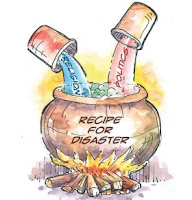 On the 28th of December, Ross Fitzgerald wrote an article in The Australian called "Whatever Happened to Secular Democracy?" In it, he complains about how religion is making its presence felt more and more in Australian politics. Although it is not really clear what solution he is proposing, he seems to be putting forward that either Christians shouldn't be in politics; that Christians shouldn't try to influence politics; or that Christians should slice off the Christian part of themselves when in politics.
On the 28th of December, Ross Fitzgerald wrote an article in The Australian called "Whatever Happened to Secular Democracy?" In it, he complains about how religion is making its presence felt more and more in Australian politics. Although it is not really clear what solution he is proposing, he seems to be putting forward that either Christians shouldn't be in politics; that Christians shouldn't try to influence politics; or that Christians should slice off the Christian part of themselves when in politics. It is all very interesting... And it seems that many people thought so as well. There were about 180 comments attached to the online version of the article and space given to 6 related letters to editors in The Weekend Australian.
Just a few thoughts...
Firstly, it seems to me that Ross (and others) doesn't really understand what a "secular democracy" is or what is meant by "the separation of church and state". Neither concepts are designed to keep religion out of politics, but to ensure that no one religion is owned by the state or that the state is owned by one religion for that matter... If people elect Christians into various political offices, then that is democracy in action. If Christians lobby for what they want to see happen in politics, then that is democracy in action. If Christians in politics act Christianly (or otherwise) in the performance of their duties, then that is democracy in action. If people don't like any of that, then they can also engage in the democratic process and get their agendas on the table and try to make whatever it is they want to have happen, happen. They can also elect representatives who aren't religious if they want to. This happens all the time. So, "secular democracy" means that religion has a place in public life, whether people like ior believe in a religion or not. To actually exclude religion from public life would be undemocratic and not in the spirit of secularism.
 Secondly, everyone has some kind of worldview, schema, philosophy of life etc etc that they live by - some are "religious" and some are "secular". These are the values that guide people's actions - even politicians! To ask a person to engage in politics and slice off their source of values as they do so, is crazy talk... No-one would ask this of a non-religious person. I think the challenge for Christian politics is to engage in democratic processes in a Christian way, that doesn't just promote the wellbeing of Christians, but of all the people they were elected to represent.
Secondly, everyone has some kind of worldview, schema, philosophy of life etc etc that they live by - some are "religious" and some are "secular". These are the values that guide people's actions - even politicians! To ask a person to engage in politics and slice off their source of values as they do so, is crazy talk... No-one would ask this of a non-religious person. I think the challenge for Christian politics is to engage in democratic processes in a Christian way, that doesn't just promote the wellbeing of Christians, but of all the people they were elected to represent. Thirdly, religion is political. People who go on about keeping religion personal and out of public life do not understand the scope of the spiritual agendas of most religions. "Personal salvation" and "personal faith" are only parts of the story. Both Old and New Testaments talk about economics, politics, citizenship, war, peace, refugees, the poor, the environment etc... The Jewish concept of "Shalom" is about cosmic renewal, and God's interest in all areas of life.
Thirdly, religion is political. People who go on about keeping religion personal and out of public life do not understand the scope of the spiritual agendas of most religions. "Personal salvation" and "personal faith" are only parts of the story. Both Old and New Testaments talk about economics, politics, citizenship, war, peace, refugees, the poor, the environment etc... The Jewish concept of "Shalom" is about cosmic renewal, and God's interest in all areas of life.I think that the concept of "Shalom" is a useful one for Christians in politics. Understanding these things, we can see a place for religion and spirituality in public life.
Shalom...

No comments:
Post a Comment